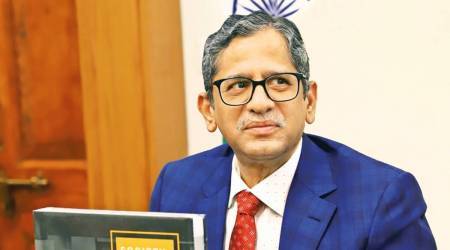Manas Dasgupta
NEW DELHI, July 23: The Chief Justice of India N.V. Ramana on Saturday lambasted the media, particularly the electronic and social media, and said the irresponsible media was taking democracy two steps backward.
Addressing an event at the National University of Study & Research in Law in Ranchi, the CJI said: “Ill-informed and agenda-driven debates on issues involving justice delivery are proving to be detrimental to the health of democracy. Biased views being propagated by media are affecting the people, weakening democracy, and harming the system. In this process, justice delivery gets adversely affected.”
In a strongly-worded criticism of the media, more specifically the electronic media, Ramana said “New media tools have enormous amplifying ability but appear to be incapable of distinguishing between the right and the wrong, the good and the bad and the real and the fake. Media trials cannot be a guiding factor in deciding cases.”
Stating that the electronic media was running “kangaroo courts” through the television debates on issues even experienced judges find difficult to decide, the CJI said the concerted campaigns against judges, particularly on social media, and media trials affect judicial functioning. “Doing justice is not an easy responsibility. It is not easy to swallow when false narratives are created about the “easy life” led by judges,” the CJI said.
The remarks assume huge significance in view of the media backlash the apex court received on the verdict earlier this month on former BJP spokesperson Nupur Sharma for her comments against Prophet Mohammad which the Supreme Court said had stoked communal tension across the country.
The CJI said the ill-informed, biased and agenda-driven debates in the media on issues pending in courts were affecting justice delivery. Media has breached its responsibility, taking democracy two steps backwards, affecting people and harming the system, the Chief Justice said.
The Chief Justice, who retires next month, said biased views being spread by the media were weakening democracy and harming the system. “In this process, justice delivery gets adversely affected,” he said. “By overstepping and breaching your responsibility, you are taking our democracy two steps backwards,” Justice Ramana said.
“Print media still has certain degree of accountability. Whereas, electronic media has zero accountability as to what it shows vanishes in thin air. Still worse is social media. Owing to the frequent transgressions and consequent social unrests, there is a growing demand for stricter media regulations and accountability,” the CJI said.
The top judge said it was best for media to self-regulate and “measure their words.” “It is best for the media to self-regulate and measure their words. You should not overstep and invite interference, either from the government or from the courts. Judges may not react immediately. Please don’t mistake it to be a weakness or helplessness. When liberties are exercised responsibly, within their domains, there will be no necessity of placing reasonable or proportionate external restrictions,” CJI Ramana said.
Speaking about the increase in physical attacks on judges, CJI Ramana asserted that while politicians, bureaucrats, police officers and other public representatives were often provided with security even after their retirement owing to the sensitiveness of their jobs, “ironically, judges are not extended similar protection”.
“These days, we are witnessing an increasing number of physical attacks on judges…Judges have to live in the same society as the people that they have been convicted, without any security or assurance of safety,” the CJI said.
The CJI also pointed out that the biggest challenge before the current day judiciary was “prioritising matters for adjudication”. “The judges can’t turn a blind eye to the social realities. The judge has to give priority to pressing matters in order to save the system from avoidable conflicts and burdens.”
The Chief Justice also expressed his worry about the increasing burden of cases piling up on judiciary with a fragile infrastructure. He added that non-filling up of judicial vacancies and not improving the infrastructure were the main reasons for pendency of cases in the country.
“Except for a few knee-jerk reactions I have not heard of any concrete plan to equip the judiciary to meet the challenges of the foreseeable future, leave alone, a long term vision for the century and ahead,” the CJI pointed out.

